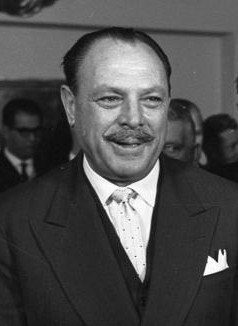
Ayub Khan
Ayub Khan was a military general and the second President of Pakistan, serving from 1958 to 1969. He is noted for his role in the 1958 coup that led to the imposition of martial law in Pakistan. His presidency is marked by significant economic growth and development reforms, but also by political repression and growing discontent, which ultimately led to his resignation amidst widespread protests. Ayub Khan's era is often referenced in discussions about military influence in Pakistani politics.
Born on May 14, 1907 (118 years old)
Global Media Ratings
Countries Mentioned
No country-level mention data available.
Interactive World Map
Each country's color is based on "Mentions" from the table above.
Recent Mentions
 Pakistan:
Ayub Khan's decade of development is referenced in the context of political stability in Pakistan.
5
Pakistan:
Ayub Khan's decade of development is referenced in the context of political stability in Pakistan.
5
 Bangladesh:
Ayub Khan's military rule faced opposition from those advocating for a democratic federal Pakistan.
4
Bangladesh:
Ayub Khan's military rule faced opposition from those advocating for a democratic federal Pakistan.
4
 Pakistan:
General Ayub Khan was the first to form an alliance with the United States, receiving military aid in return.
5
Pakistan:
General Ayub Khan was the first to form an alliance with the United States, receiving military aid in return.
5
 Pakistan:
General Ayub Khan became the Army Chief on January 7, 1951, and played a crucial role in Pakistan's political landscape.
5
Pakistan:
General Ayub Khan became the Army Chief on January 7, 1951, and played a crucial role in Pakistan's political landscape.
5
 India:
Ayub Khan’s military was exposed during the conflict at Sialkot in 1965.
4
India:
Ayub Khan’s military was exposed during the conflict at Sialkot in 1965.
4
 Pakistan:
Ayub Khan's actions were pivotal in the political turmoil and eventual coup in Pakistan.
3
Pakistan:
Ayub Khan's actions were pivotal in the political turmoil and eventual coup in Pakistan.
3
 Pakistan:
The first major attempt at reform came in the 1960s under General Ayub Khan.
6
Pakistan:
The first major attempt at reform came in the 1960s under General Ayub Khan.
6
 India:
Ayub Khan was the President of Pakistan who signed the Indus Waters Treaty with Nehru.
7
India:
Ayub Khan was the President of Pakistan who signed the Indus Waters Treaty with Nehru.
7
 Pakistan:
Ayub Khan returned home politically damaged after the talks in Tashkent.
5
Pakistan:
Ayub Khan returned home politically damaged after the talks in Tashkent.
5
 Bangladesh:
Ayub Khan was the last Pakistani army chief to receive such an invitation to the White House.
5
Bangladesh:
Ayub Khan was the last Pakistani army chief to receive such an invitation to the White House.
5